Dear Zazie, Here is today’s Lovers’ Almanac from Mac Tag dedicated to his muse. Follow us on twitter @cowboycoleridge. Comes the hour, comes your love? If the hour came, what would you do? Rhett
The Lovers’ Almanc
Dear Muse,
“Sounds literary”
from that letter Joyce wrote
“Guess that answers that”
what
“Are there anymore
real romantics”
touché my dear
“And so”
happy to oblige
what we thought
was denied has come
“Good thing one of us
is patient”
we arrived when
we were supposed to
“Yes, and now the hour”
come here
© copyright 2023 mac tag/cowboy coleridge all rights reserved
© copyright 2021 mac tag/cowboy coleridge all rights reserved
© copyright 2020 mac tag/cowboy coleridge all rights reserved
one finds another
a wide capacity
for writin’ and paintin’
overflowin’ with all the day
and each moment brings
life, a cape, now doubled
stretchin’ out before them
this only, completely,
comes from listenin’
to the melody, now
that the hour has come
© copyright 2019 mac tag/cowboy coleridge all rights reserved
In honour of Valentine’s Day, more lyrical love letters from the literary world.
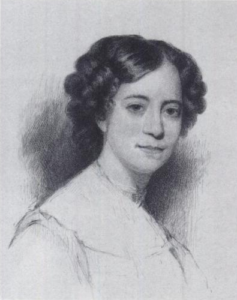 Nathaniel Hawthorne wrote Puritan-inspired, New England-based works of dark romanticism, and he was largely a recluse. But he was cheerful about his personal romantic life. In his 30s, he fell in love with another reclusive person, Sophia Peabody. She and Hawthorne secretly became engaged on New Year’s Day in 1839.
Nathaniel Hawthorne wrote Puritan-inspired, New England-based works of dark romanticism, and he was largely a recluse. But he was cheerful about his personal romantic life. In his 30s, he fell in love with another reclusive person, Sophia Peabody. She and Hawthorne secretly became engaged on New Year’s Day in 1839.
They got married in her family’s bookstore in Boston. She was 32; he was 38. The newlyweds moved out to an old historic mansion in Concord, Massachusetts, where Henry David Thoreau made a vegetable garden for just the two of them. Hawthorne wrote to his sister: “We are as happy as people can be, without making themselves ridiculous, and might be even happier; but, as a matter of taste, we choose to stop short at this point.”
Then, on his first wedding anniversary, he wrote to his wife: “We were never so happy as now — never such wide capacity for happiness, yet overflowing with all that the day and every moment brings to us. Methinks this birth-day of our married life is like a cape, which we have now doubled and find a more infinite ocean of love stretching out before us.”
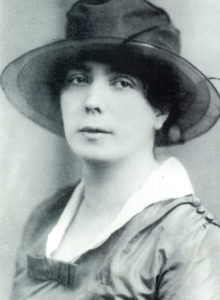 Writer James Joyce wrote to his wife Nora Barnacle, on 25 October 1909, “You are my only love. You have me completely in your power. I know and feel that if I am to write anything fine or noble in the future I shall do so only by listening to the doors of your heart. … I love you deeply and truly, Nora. … There is not a particle of my love that is not yours. … If you would only let me I would speak to you of everything in my mind but sometimes I fancy from your look that you would only be bored by me. Anyhow, Nora, I love you. I cannot live without you. I would like to give you everything that is mine, any knowledge I have (little as it is) any emotions I myself feel or have felt, any likes or dislikes I have, any hopes I have or remorse. I would like to go through life side by side with you, telling you more and more until we grew to be one being together until the hour should come for us to die. Even now the tears rush to my eyes and sobs choke my throat as I write this. Nora, we have only one short life in which to love. O my darling be only a little kinder to me, bear with me a little even if I am inconsiderate and unmanageable and believe me we will be happy together. Let me love you in my own way. Let me have your heart always close to mine to hear every throb of my life, every sorrow, every joy.”
Writer James Joyce wrote to his wife Nora Barnacle, on 25 October 1909, “You are my only love. You have me completely in your power. I know and feel that if I am to write anything fine or noble in the future I shall do so only by listening to the doors of your heart. … I love you deeply and truly, Nora. … There is not a particle of my love that is not yours. … If you would only let me I would speak to you of everything in my mind but sometimes I fancy from your look that you would only be bored by me. Anyhow, Nora, I love you. I cannot live without you. I would like to give you everything that is mine, any knowledge I have (little as it is) any emotions I myself feel or have felt, any likes or dislikes I have, any hopes I have or remorse. I would like to go through life side by side with you, telling you more and more until we grew to be one being together until the hour should come for us to die. Even now the tears rush to my eyes and sobs choke my throat as I write this. Nora, we have only one short life in which to love. O my darling be only a little kinder to me, bear with me a little even if I am inconsiderate and unmanageable and believe me we will be happy together. Let me love you in my own way. Let me have your heart always close to mine to hear every throb of my life, every sorrow, every joy.”
Here is the Poem of the Day inspired by the these letters. Hope you like……
The Hour Should Come
One recluse finds another
They lived in the country
He took care of the livestock
And wrote of his love for her
She tended her trees and garden
And painted her love for him
They had a wide capacity for happiness,
Overflowin’ with all that the day
And each moment brought them
Their life, like a cape, now doubled
With an infinite ocean of love
Stretchin’ out before them
She, his only love, had him
Completely in her power
All he wrote, fine or noble
Came from listenin’
To the beat of her heart
He loved her deeply and truly
He had no love that was not hers
He wanted to speak to her
Of everything in his mind
He loved her. He could not live without her
Wanted to give her everything that was his,
His knowledge, his emotions, his likes,
His dislikes, his dreams, his remorse
Wanted to go through life side by side with her,
Wanted her to believe they would be happy together,
Wanted her to let him love her in his own way,
Wanted her to let him have her heart
Always close to his to hear every
Throb of her life, every sorrow, every joy
Tellin’ her more and more until
They grew to be one bein’ together
Until the hour should come for them
Now these many years later
When he reads this poem
Tears rush to his eyes
Sobs choke his throat
They had only one
Short life in which to love
But then the hour came
For only one of them
The Song of the Day is “If Came the Hour” by Secret Garden set to Mozart‘s Sinfonia Concertante in E-flat, K364– II..Andante. We do not own the rights to this song. All rights reserved by the rightful owner. No copyright infringement intended.
| Eleanor Farjeon | |
|---|---|

Farjeon in 1899
|
|
Today is the birthday of Eleanor Farjeon (London 13 February 1881 – 5 June 1965 Hampstead, London); English author of children’s stories and plays, poetry, biography, history and satire. Several of her works had illustrations by Edward Ardizzone. Some of her correspondence has also been published.
Verse
It’s no use crying over spilt evils. It’s better to mop them up laughing.
- Gypsy and Ginger (1920)
Of troubles know I none,
Of pleasures know I many —
I rove beneath the sun
Without a single penny.
- Vagrant Songs, II
- Old sundial, you stand here for Time:
For Love, the vine that round your base
Its tendrils twines, and dares to climb
And lay one flower-capped spray in grace
Without the asking on your cold
Unsmiling and unfrowning face.- Time And Love
- Upon your shattered ruins where
This vine will flourish still, as rare,
As fresh, as fragrant as of old.
Love will not crumble.- Time And Love
- Dropt tears have hastened your decay
And brought you one step nigher death;
And you have heard, unthrilled, unmoved,
The music of Love’s golden breath
And seen the light in eyes that loved.
You think you hold the core and kernel
Of all the world beneath your crust,
Old dial? But when you lie in dust,
This vine will bloom, strong, green, and proved.
Love is eternal.- Time And Love
Morning Has Broken (1931)
- This poem was set to music and became a widely used hymn and became further popularized by the performance of Cat Stevens on his album Teaser and the Firecat (1971) · Performance by Cat Stevens (1976)
- Morning has broken,
Like the first morning,
Blackbird has spoken
Like the first bird.
Praise for the singing!
Praise for the morning!
Praise for them springing
Fresh from the Word!
- Praise with elation,
Praise every morning,
God’s re-creation
Of the new day!
The New Book of Days (1961)
- From the blood of Medusa
Pegasus sprang.
His hoof of heaven
Like melody rang.- Pegasus, St. 1, p. 181
- His tail was a fountain.
His nostrils were caves.
His mane and his forelock
Were musical waves.
He neighed like a trumpet.
He cooed like a dove.
He was stronger than terror
And swifter than love.- Pegasus, St. 2, p. 181
- He could not be captured,
He could not be bought,
His running was rhythm,
His standing was thought;
With one eye on sorrow
And one eye on mirth,
He galloped in heaven
And gambolled on earth. - And only the poet
With wings to his brain
Can mount him and ride him
Without any rein,
The stallion of heaven,
The steed of the skies,
The horse of the singer
Who sings as he flies.- Pegasus, St. 3 & 4, p. 181
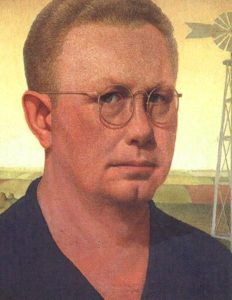 Today is the birthday of Grant Wood (Grant DeVolson Wood; Anamosa, Iowa; February 13, 1891 – February 12, 1942 Iowa City, Iowa); painter best known for his paintings depicting the rural American Midwest, particularly American Gothic (1930), which has become an iconic painting of the 20th century.
Today is the birthday of Grant Wood (Grant DeVolson Wood; Anamosa, Iowa; February 13, 1891 – February 12, 1942 Iowa City, Iowa); painter best known for his paintings depicting the rural American Midwest, particularly American Gothic (1930), which has become an iconic painting of the 20th century.
From 1935 to 1938, Wood was married to Sara Sherman Maxon. Friends considered the marriage a mistake for Wood.
It is thought that Wood was a closeted homosexual.
On the eve of his 51st birthday, Wood died at Iowa City university hospital of pancreatic cancer. He is buried at Riverside Cemetery, Anamosa, Iowa.
Gallery
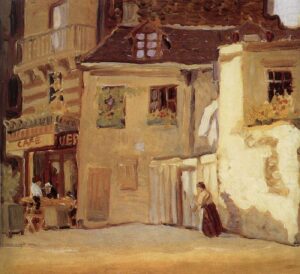
Coin du Café de Paris
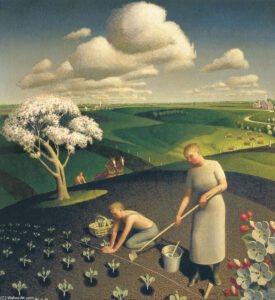

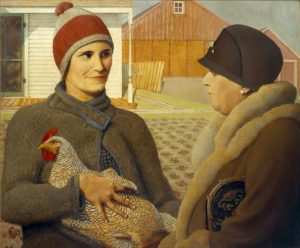
Appraisal
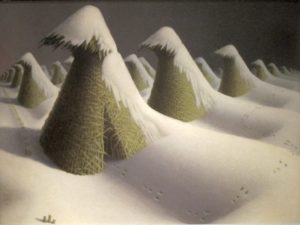
January
-
 Fall Plowing
Fall Plowing -
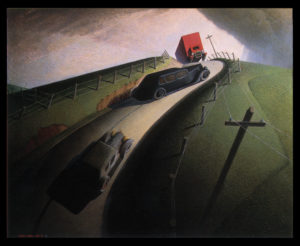
Death on Ridge Road
Mac Tag

No Comments on "The Lovers’ Chronicle 13 February – the hour should come – Hawthorne Love Letters – verse by Eleanor Farjeon – art by Grant Wood"